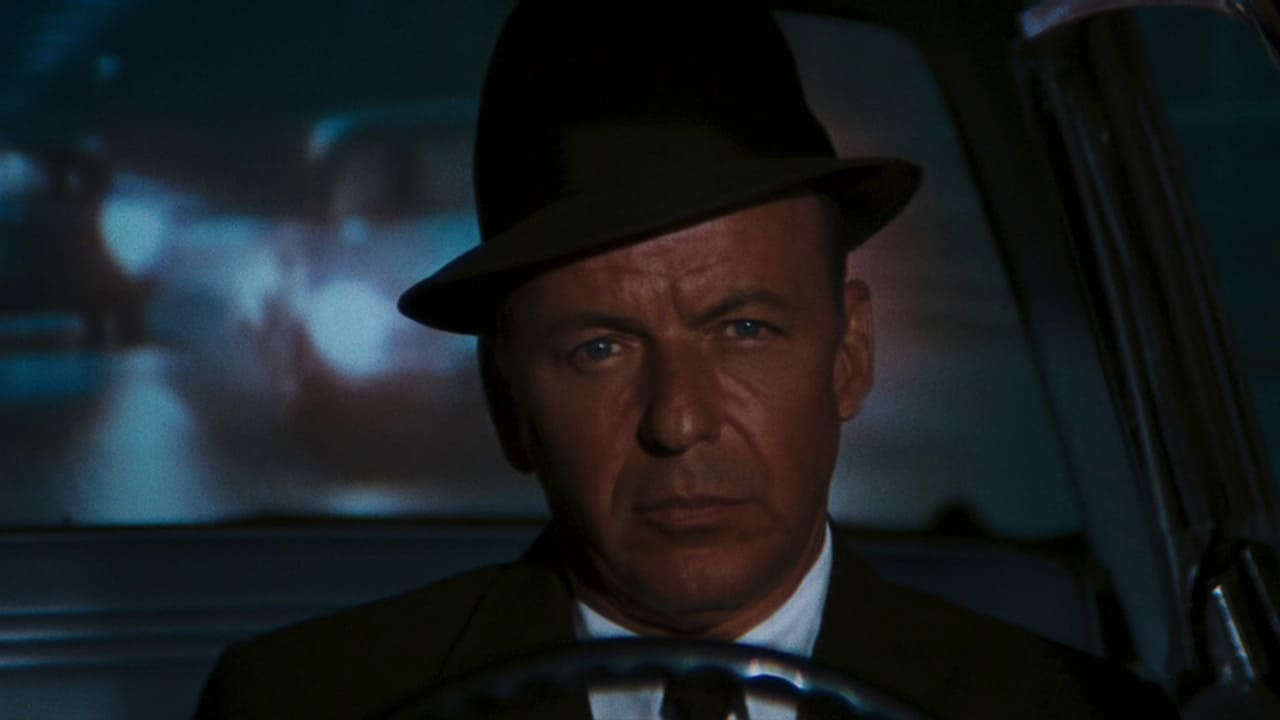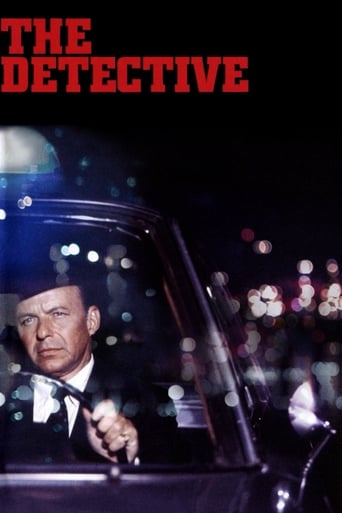

Yeah, I'll admit it: I came to this movie because of "Die Hard" (the same author wrote the source novels for both movies). It's a movie called "The Detective" and stars Sinatra; seems like a good one, right? Eh.One of the notable things about this film is its depiction (or at least inclusion of homosexuals. that they're not shown as degenerate monsters is something. This could've been a lot more "hard-nosed" towards these individuals, but it wasn't. I was hoping for a harder nose on Sinatra in the movie, but he came off oddly tame (brooding seemed to be what he was going for). But that might have more to do with the unimaginative direction. Everything's clunky as a result.The other thing here worth mentioning is the quietly menacing Robert Duvall, who ably walks away with this movie.5/10
... View MoreDated by its handling of the formerly taboo subject of homosexuality and further hampered by an overly sober script, nevertheless this Frank Sinatra neo-noir has a lot to commend itself.Adapted from a popular novel of the day by Abby Mann in a pre-Kojak assignment, it's difficult not to see Sinatra's Joe Leeming's battle-weary, incorruptible cop as a precursor to Mann's most famous invented character from the next decade. The plot too could have come from the TV show albeit with the utilisation of more adult themes, including the character of Sinatra's nymphomaniac wife (Lee Remick), the graphic depiction of the opening murder and execution of an innocent suspect, egged onto a false confession by a promotion-hungry Sinatra. This is one of the problems of the script, with Sinatra set up from the start as a down-to-earth workaday detective but with a social conscience of course. So Frank gets to soapbox a lot about the ghetto and poverty on the one hand and corruption and cover-ups in high places on the other. Sinatra manfully tries to carry off this heavy load on his own, but can't help but look awkward when cajoling the damning confession from his suspect or as if he's memorised some of his equally damning speeches against the powers that be. Credit him for taking on a modernist role at odds, I'd have said, with his family-entertainer background. There are a lot of big names in support, with Robert Duvall noteworthy as an over-zealous underling and Jack Klugman as Sinatra's trusted deputy. Sugar Ray Robinson has a fair old fight with his lines as an over-impressionable black colleague of Sinatra's, but I'm not sure I could award him the decision in the final reckoning. Smoothly and occasionally stylishly directed by Gordon Jenkins, the film is nonetheless stuck in a time-warp of its own creation and suffers accordingly, notwithstanding it generally has its heart in the right place.
... View MoreThe Detective (1968); Directed by: Gordon Douglas; Starring: Frank Sinatra, Lee Remick, Jack Klugman, Jacqueline Bisset, Robert Duvall et al.This relatively unknown film features an impressive cast and a score by Jerry Goldsmith, which were my main reasons for watching it. It has strong themes too though: homophobia, corruption and moral crisis. These are ingredients for a challenging drama, but sadly the film doesn't use them well.The film has two parts, which are intertwined with some flashbacks. The first part features Joe Leland (Frank Sinatra) investigating the murder of a homosexual, the second part features him investigating a mysterious death and the flashbacks involve the relationship between Joe and his ex-wife. Thematically it's quite involving. Joe Leland is a no-nonsense cop who has to make some tough moral decisions. His colleagues have no respect for homosexuals and they even mistreat them, while Joe beliefs they deserve a fair treatment. In one scene, Nestor (Robert Duvall) is hitting a gay suspect and Joe must stop this, so he knocks Nestor to the ground. A brave thing to do when most of your colleagues act like Nestor does. Another conflict involves politics. Promotions depend on them and politicians care more for money than for solving crime and the bad conditions for those living on the streets. Joe believes in hard work though and he wants to make the city a better place. These aspects make for the central moral problem of the film. Joe gets a promotion because he solved the first case very quick, but doubts if he got the right person. Joe's doubt is shown really well in a scene which features Joe and some colleagues watching the suspect getting the electric chair, but Joe can't watch. The second part of the film focuses more on the corruption in the force and on a political conspiracy. Joe, with the help of Dave (another rare honest cop, played by Jack Klugman), finds out about this through Norma MacIver (Jacqueline Bisset) who suspects there's more to her husbands death than meets the eye. This interests Joe since it gives him the opportunity to show that he wants the police to be clean and honest. But when Joe starts digging, he learns some terrible truths from the death of Colin MacIver (William Windom) and what that means for himself. It appears MacIver's death and the death of the homosexual are linked together. This second part works really well story wise, in how it is linked to the first part; the two become one in story and theme. Finally, there's the love story between Joe and Karen (Lee Remick). While it's a tragic story and features some interesting problems, it fails to really fit in with the other parts of the film. Karen can't commit fully to Joe, since she can't stay away from other men, which Joe can't cope with and therefore they separate. This makes Joe a sad person, but it doesn't have a real importance to the overall plot and therefore feels more like a random side story. The only connection is that Karen's psychiatrist is connected somehow to the death of MacIver, but I think that connection is too weak.The film is a bit of a mess though, which comes from the fact that it deals with different time periods and some rapid shifting between locations. Continuity is a major problem for the love story. It appears Joe and Karen met some time before the murder of the homosexual, but at some point the flashback seems to go into the timeframe of this murder and you loose track of where we are in time and it becomes confusing. This isn't helped by the bad use of locations: at some point we think we enter Karen's apartment, but a phone rings and Joe answers and it appears to be his apartment. This all makes it unnecessarily difficult to follow and to understand in what stage of their relationship we actually are, thus harming the emotional aspect. The transition between the two parts of the film is awkward too, since we suddenly jump forward for an unknown period of time, which made me feel somewhat lost in the film. I couldn't help but feel that with some more care from the writer or director, these problems could have been solved and the film would've felt more cohesive and the situations more emotionally involving.Director Gordon Douglas went for an 'experimental' approach, but this doesn't work. For example: he shoots persons talking to each other, but lets them talk straight into the camera, which frankly doesn't add anything and works distracting. The opening shot features a New York street upside down, only to reveal that the camera is filming the streets' reflection in the car roof, which I found to be annoying, as were some bad back screen projections. The attempted style doesn't work properly and becomes distracting, making the film feel dated. The actors deliver good work though. Frank Sinatra delivers a strong performance, yet Lee Remick wasn't really special. The supporting cast is fine too, with a lovely Jacqueline Bisset, a strong Robert Duvall, a friendly Jack Klugman and Horace McMahon delivers a strong performance as the police captain. The portrayal of the homosexuals is quite over-the-top though, with Tony Musante being the most over-the-top as the psychotic suspect. The film is scored by Jerry Goldsmith, but I found it to be one of his weaker scores. It's a sad jazzy score, portraying the problems haunting Joe, but I didn't really like it. The underscore in scenes between Joe and Karen works the best and is quite pleasant, but overall it was slightly disappointing.All in all, this is a film which dares to tackle a controversial subject, but is brought down by continuity problems and a failed attempt at innovative filming. The acting and the moral problems Joe is presented with make this film earn a positive rating though.6/10.
... View MoreI really didn't know what to expect from this film, except that Frank is going to be a detective and probably tough, with lots of girls around him. What I got was an intelligent and realistic look at the police dept. in the 60s probing into society's sexual differences in the death of a homosexual. It has a great cast, including Lee Remick, who's always great and who seems to be attracted to movies of this ilk, like Experiment in Terror and No Way to Treat a Lady. It makes good use of time and place, and its use of flashbacks comes off surprisingly well, to portray the courtship of Frank and Lee, which you don't expect in a movie with a violent subplot in it. (But which is the subplot?) But I did appreciate its time in telling his own personal life, rather than just centering on his case. And, he's not surrounded by girls. So, if you're looking for something flashy like Dean Martin's Matt Helm, this isn't for you. It's better; it's a mature film with real life consequences. (But, yes, there is a murder to solve and Frank does it in 60s style.)
... View More